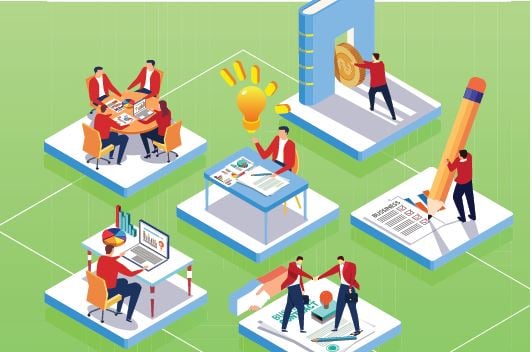
The workforce growth rate is slowing, but that shouldn’t necessarily mean that productivity and innovation will falter

The workforce growth rate is slowing, but that shouldn’t necessarily mean that productivity and innovation will falter
“Either we self-disrupt or we are disrupted by the competition.” Those were the words of Lim Swee Say, former Minister of Manpower, back in November 2016. He was talking specifically about the growing need for small and medium enterprises to transform themselves into ‘Lean Enterprises’.
That core message has sparked Workforce Singapore’s (WSG’s) ongoing marketing e orts, which send a straightforward message: ‘Transform and Grow’. However, underlying those words lie a number of potentially daunting challenges for both employers and employees.
While factoring in how to best navigate oncoming economic challenges, attracting and retaining local manpower, and improving productivity and innovation, the goal of the Transform and Grow initiative is to provide and support for businesses to be agile, flexible and lean in today’s challenging climate.
Why change?
There are some fundamental demographic issues facing Singaporean society – and by extension Singaporean businesses – which are requiring a rethink of how businesses are run and human resources are utilised. The minister summed up the key challenge.
“With ageing and a low birth rate, the local workforce is growing much slower, and may stagnate in the next decade. So, in other words, 10 years from now, the local workforce will stop growing,” he said.
“With foreign manpower growing much slower too, our challenge is to ensure that this sharp drop in our total workforce growth will not become the bottleneck in the future growth of our economy and also for your businesses.”
To break this manpower bottleneck of the future, the tripartite partners have come together to jointly spearhead the Lean Enterprise Development Scheme (LEDS) since October 2015.
The minister added that these partners are NTUC and e2i of the labour movement; trade associations and chambers such as the SNF; and key agencies including SPRING, WSG, the IMDA, the Singapore Tourism Board, the Economic Development Board, the Building and Construction Authority, and others.
“We are here to provide one-stop support to help our SMEs to build new capability so that they can grow better, to build new capacity so that you can grow bigger, to build new market to grow faster, and to build new human capital to grow stronger,” he said.
The path to now
In October 2015, the Ministry of Manpower flagged that Singapore’s total workforce growth was projected to slow going forward. As SMEs collectively are a major source of employment for Singaporean workers, it was recognised that helping them to adapt to this new business environment would be critical. MOM launched the pilot LED Scheme to help progressive SMEs transform and grow in the new manpower-lean landscape. The objective is to support SMEs that want to be pioneers and early adopters of change by becoming more productive, more innovative, and more manpower-lean.
The Singaporean government has also made significant investments in helping SMEs upgrade, through programs such as the Capability Development Grant administered by SPRING, and Enhanced iSPRINT by the Infocomm Development Authority. These schemes cover three broad areas:
To build a stronger core Singaporean workforce, other initiatives have focused on:
What’s next?
In her keynote address at the LED Symposium in November 2017, Josephine Teo, who now helms the Manpower Ministry, said investment in innovation helped companies upgrade their hardware and hopefully improve their workflow.
“At the same time, we need to upgrade the software, and the most important of them all is your human capital – your workers,” she said.
Minister Teo added that under the current LED Scheme employers could obtain support for temporary foreign workers to have the capacity to train and upskill local workers to operate new machines and implement new work processes. Some 5,200 organisations – from micro SMEs to multinationals – have taken up the LED Scheme, across all sectors, including food services, construction, retail, logistics and manufacturing.
“We now can see more companies having the determination and the ideas on how to grow their business the smarter way, by improving processes and also by employing more technology, not necessarily more people,” Minister Teo said.
Looking ahead, this will be taken a step further by helping employers to enhance the capability of their local workforces, so as to accelerate transformation.
“We are piloting a new scheme called the Capability Transfer Programme, or CTP,” the minister said. “CTP facilitates the transfer of capabilities to help local workers pick up world-class skills and knowledge lacking or in short supply in Singapore. Not only will our local workers attain new skills, they will get better jobs and be ready for the future. Higher levels of support will be given for industry projects and projects with high impact.”
Furthermore, the Adapt and Grow initiative has helped place more than 25,000 jobseekers into new jobs and careers in 2017, about 20% more than in 2016. The ongoing goal is to help both missed matches − where employers and jobseekers have not found each other – and mismatches, where there are skills or wage gaps that make it hard for the jobseeker to secure a job.
The existing Jobs Bank will also be transformed into a new platform called MyCareersFuture. This will have new features to help jobseekers and employers find better matches. It will have intelligent job matching and can recommend jobs to jobseekers that will best fit their skill sets. It will also highlight jobs that are supported by Adapt and Grow initiatives such as the Professional Conversion Programmes, to help bridge job and skill mismatches.
Help at hand
There is no silver bullet to resolve Singapore’s workforce challenges, but employers should know where they can get support. Like all Adapt and Grow initiatives, the LED Scheme supports all organisations. It provides a ‘one-stop’ service for businesses, especially SMEs, to access schemes offered by different government agencies, without having to figure out where and who to approach for what.
 At a speech at a Workplan Seminar in May, Josephine Teo, Minister for Manpower, commented on the rapidly changing world of work.
At a speech at a Workplan Seminar in May, Josephine Teo, Minister for Manpower, commented on the rapidly changing world of work.